CIVIL LAW Lecture 4 Subjects of civil

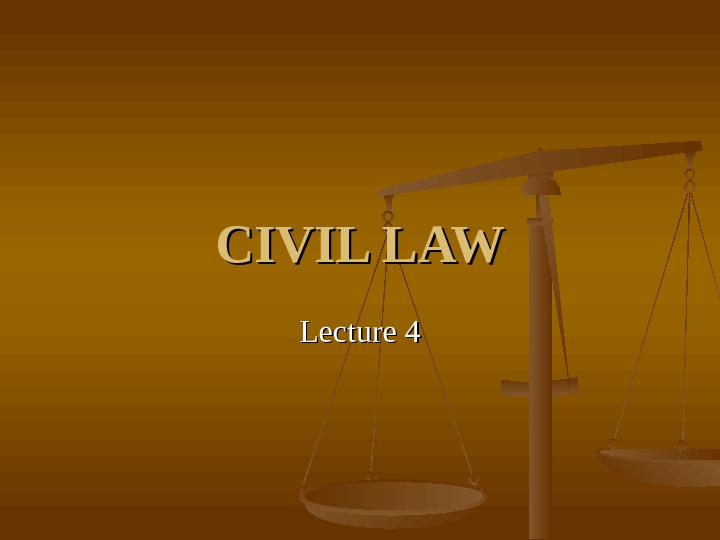
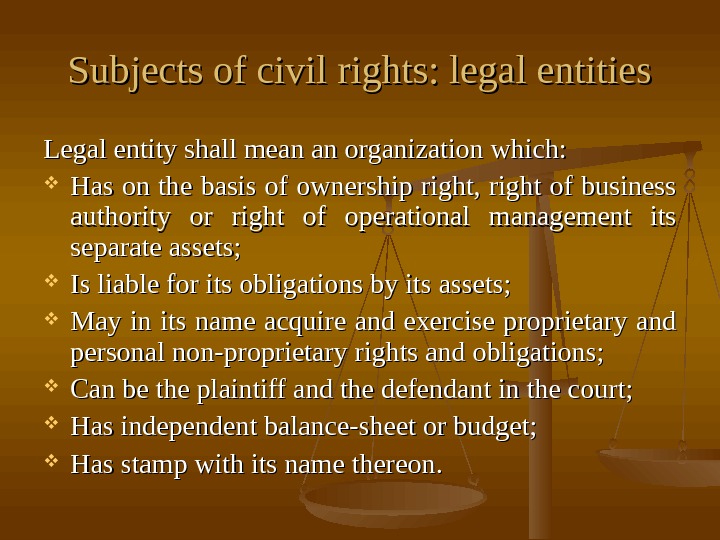
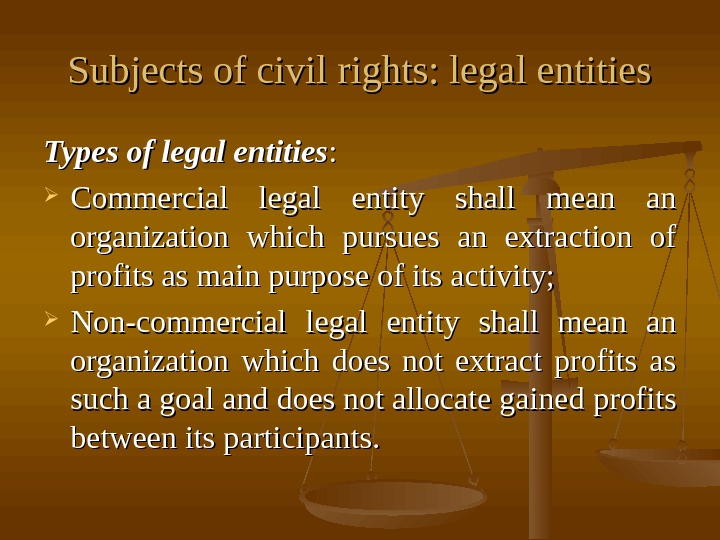
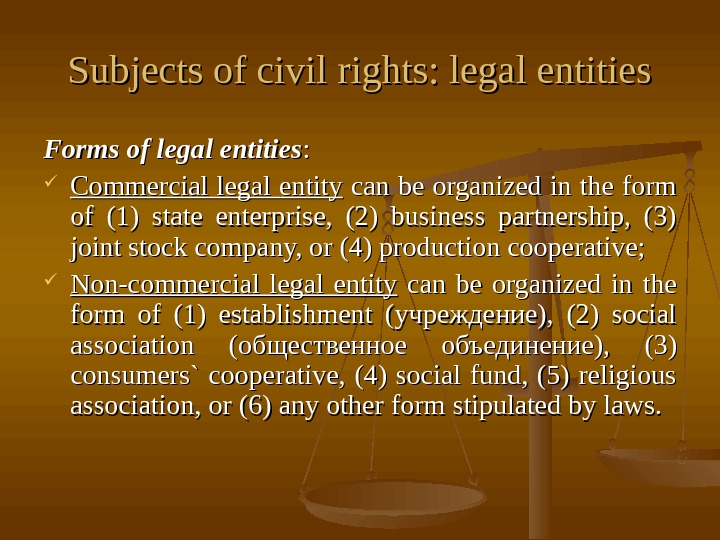
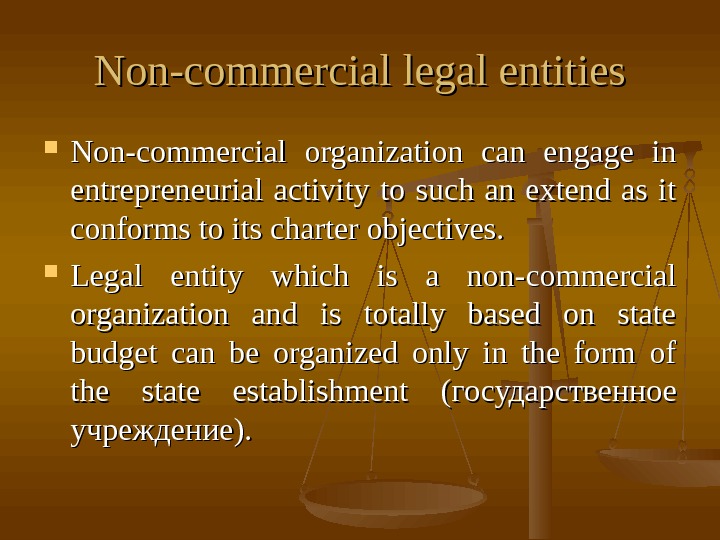
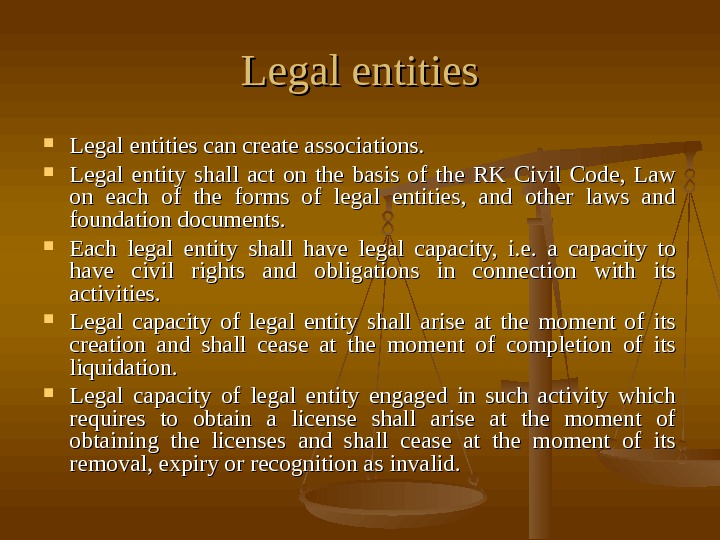
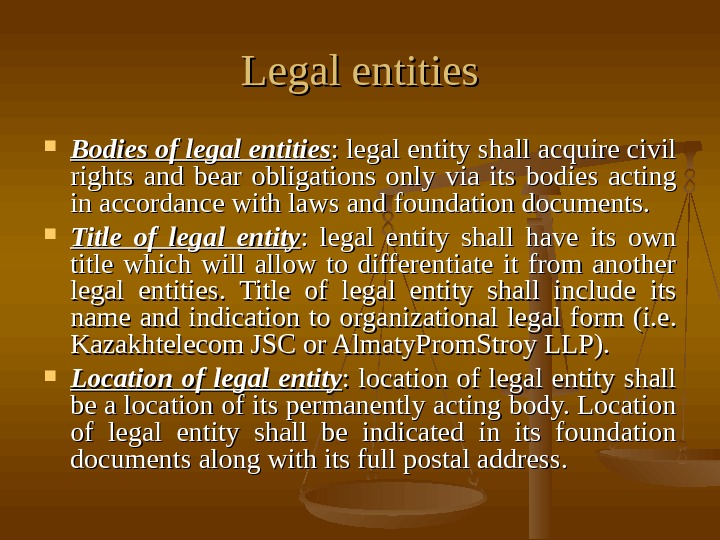
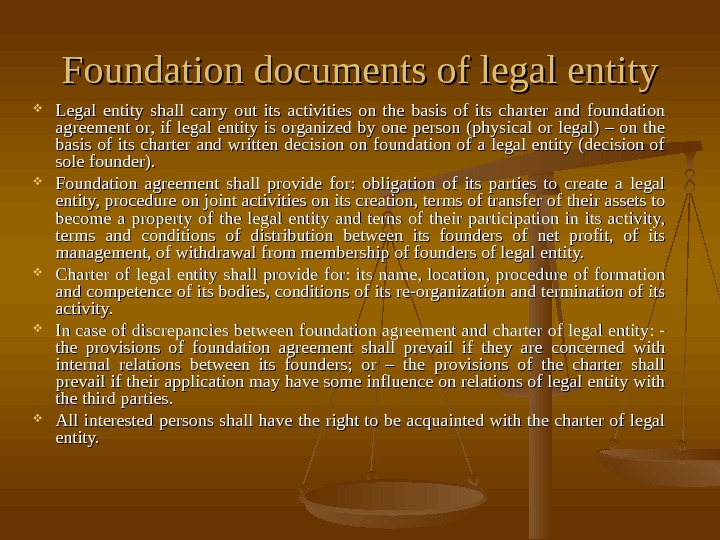
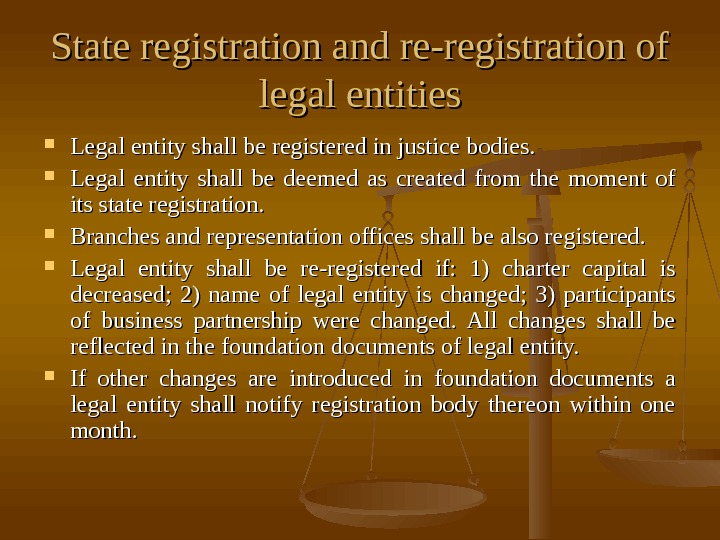
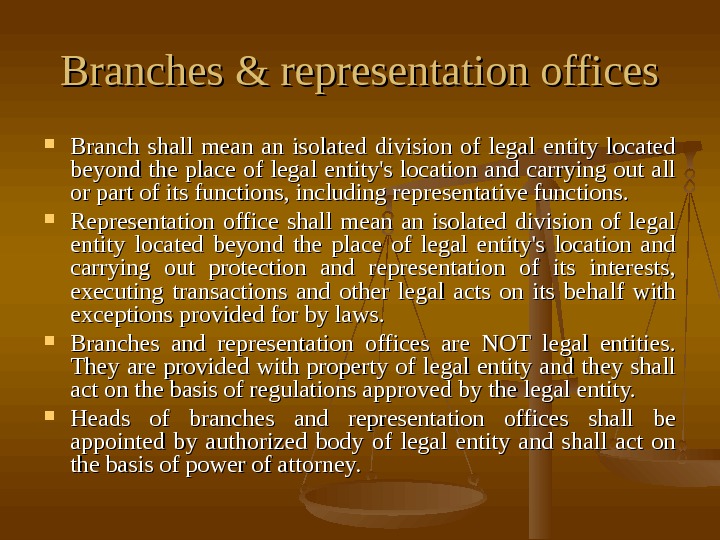
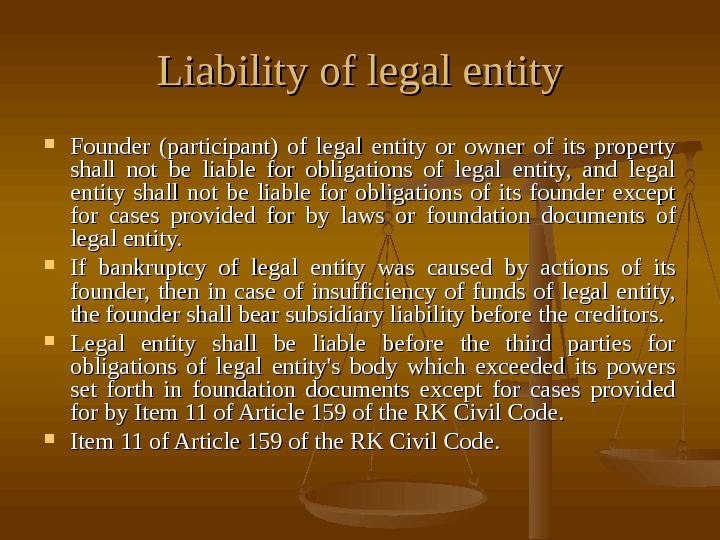
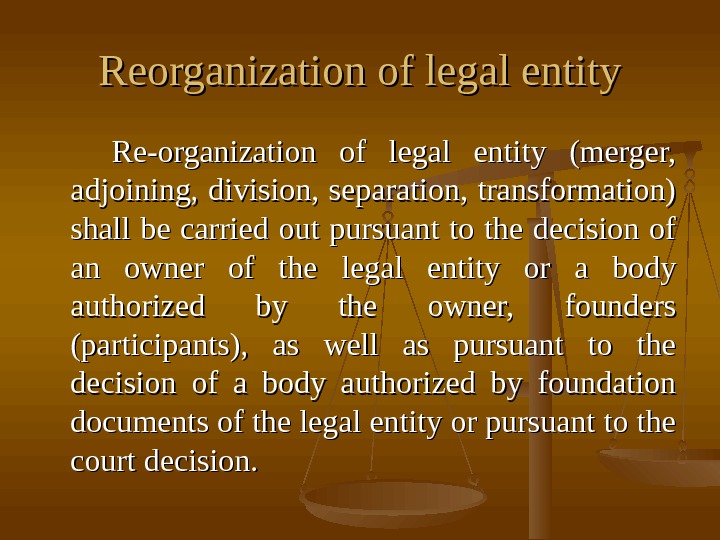
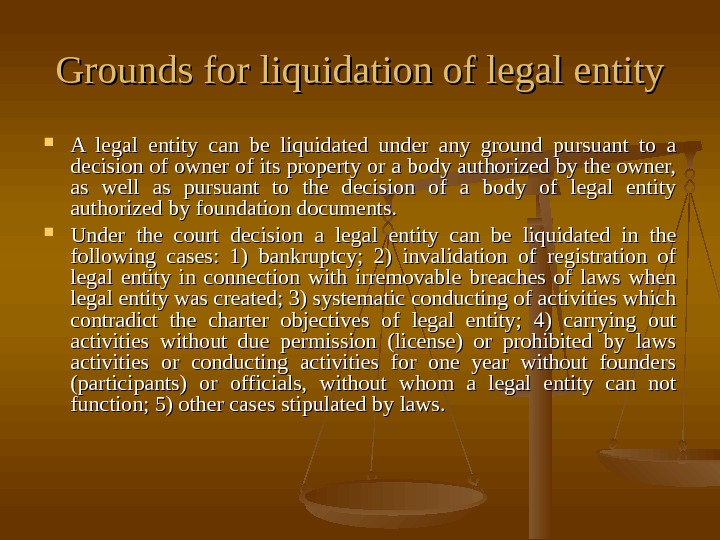

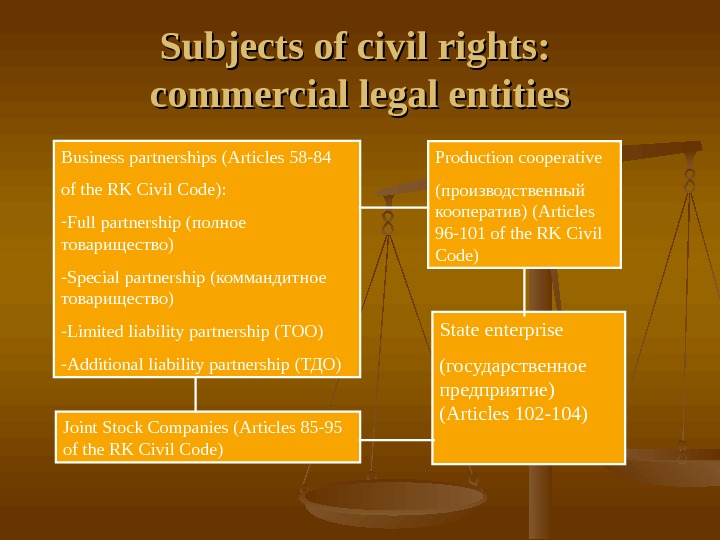
civil_law_subjects_of_civil_rights_lecture_4.ppt
- Размер: 420 Кб
- Количество слайдов: 15
Описание презентации CIVIL LAW Lecture 4 Subjects of civil по слайдам
 CIVIL LAW Lecture
CIVIL LAW Lecture
 Subjects of civil rights: legal entities Legal entity shall mean an organization which: Has on the basis of ownership right, right of business authority or right of operational management its separate assets; Is liable for its obligations by its assets; May in its name acquire and exercise proprietary and personal non-proprietary rights and obligations; Can be the plaintiff and the defendant in the court; Has independent balance-sheet or budget; Has stamp with its name thereon.
Subjects of civil rights: legal entities Legal entity shall mean an organization which: Has on the basis of ownership right, right of business authority or right of operational management its separate assets; Is liable for its obligations by its assets; May in its name acquire and exercise proprietary and personal non-proprietary rights and obligations; Can be the plaintiff and the defendant in the court; Has independent balance-sheet or budget; Has stamp with its name thereon.
 Subjects of civil rights: legal entities Types of legal entities : : Commercial legal entity shall mean an organization which pursues an extraction of profits as main purpose of its activity; Non-commercial legal entity shall mean an organization which does not extract profits as such a goal and does not allocate gained profits between its participants.
Subjects of civil rights: legal entities Types of legal entities : : Commercial legal entity shall mean an organization which pursues an extraction of profits as main purpose of its activity; Non-commercial legal entity shall mean an organization which does not extract profits as such a goal and does not allocate gained profits between its participants.
 Subjects of civil rights: legal entities Forms of legal entities : : Commercial legal entity can be organized in the form of (1) state enterprise, (2) business partnership, (3) joint stock company, or (4) production cooperative; Non-commercial legal entity can be organized in the form of (1) establishment ( учреждение) , (2) social association ( общественное объединение) , (3) consumers` cooperative, (4) social fund, (5) religious association, or (6) any other form stipulated by laws.
Subjects of civil rights: legal entities Forms of legal entities : : Commercial legal entity can be organized in the form of (1) state enterprise, (2) business partnership, (3) joint stock company, or (4) production cooperative; Non-commercial legal entity can be organized in the form of (1) establishment ( учреждение) , (2) social association ( общественное объединение) , (3) consumers` cooperative, (4) social fund, (5) religious association, or (6) any other form stipulated by laws.
 Non-commercial legal entities Non-commercial organization can engage in entrepreneurial activity to such an extend as it conforms to its charter objectives. Legal entity which is a non-commercial organization and is totally based on state budget can be organized only in the form of the state establishment ( государственное учреждение).
Non-commercial legal entities Non-commercial organization can engage in entrepreneurial activity to such an extend as it conforms to its charter objectives. Legal entity which is a non-commercial organization and is totally based on state budget can be organized only in the form of the state establishment ( государственное учреждение).
 Legal entities can create associations. Legal entity shall act on the basis of the RK Civil Code, Law on each of the forms of legal entities, and other laws and foundation documents. Each legal entity shall have legal capacity, i. e. a capacity to have civil rights and obligations in connection with its activities. Legal capacity of legal entity shall arise at the moment of its creation and shall cease at the moment of completion of its liquidation. Legal capacity of legal entity engaged in such activity which requires to obtain a license shall arise at the moment of obtaining the licenses and shall cease at the moment of its removal, expiry or recognition as invalid.
Legal entities can create associations. Legal entity shall act on the basis of the RK Civil Code, Law on each of the forms of legal entities, and other laws and foundation documents. Each legal entity shall have legal capacity, i. e. a capacity to have civil rights and obligations in connection with its activities. Legal capacity of legal entity shall arise at the moment of its creation and shall cease at the moment of completion of its liquidation. Legal capacity of legal entity engaged in such activity which requires to obtain a license shall arise at the moment of obtaining the licenses and shall cease at the moment of its removal, expiry or recognition as invalid.
 Legal entities Bodies of legal entities : legal entity shall acquire civil rights and bear obligations only via its bodies acting in accordance with laws and foundation documents. Title of legal entity : legal entity shall have its own title which will allow to differentiate it from another legal entities. Title of legal entity shall include its name and indication to organizational legal form (i. e. Kazakhtelecom JSC or Almaty. Prom. Stroy LLP). Location of legal entity : location of legal entity shall be a location of its permanently acting body. Location of legal entity shall be indicated in its foundation documents along with its full postal address.
Legal entities Bodies of legal entities : legal entity shall acquire civil rights and bear obligations only via its bodies acting in accordance with laws and foundation documents. Title of legal entity : legal entity shall have its own title which will allow to differentiate it from another legal entities. Title of legal entity shall include its name and indication to organizational legal form (i. e. Kazakhtelecom JSC or Almaty. Prom. Stroy LLP). Location of legal entity : location of legal entity shall be a location of its permanently acting body. Location of legal entity shall be indicated in its foundation documents along with its full postal address.
 Foundation documents of legal entity Legal entity shall carry out its activities on the basis of its charter and foundation agreement or, if legal entity is organized by one person (physical or legal) – on the basis of its charter and written decision on foundation of a legal entity (decision of sole founder). Foundation agreement shall provide for: obligation of its parties to create a legal entity, procedure on joint activities on its creation, terms of transfer of their assets to become a property of the legal entity and terns of their participation in its activity, terms and conditions of distribution between its founders of net profit, of its management, of withdrawal from membership of founders of legal entity. Charter of legal entity shall provide for: its name, location, procedure of formation and competence of its bodies, conditions of its re-organization and termination of its activity. In case of discrepancies between foundation agreement and charter of legal entity: — the provisions of foundation agreement shall prevail if they are concerned with internal relations between its founders; or – the provisions of the charter shall prevail if their application may have some influence on relations of legal entity with the third parties. All interested persons shall have the right to be acquainted with the charter of legal entity.
Foundation documents of legal entity Legal entity shall carry out its activities on the basis of its charter and foundation agreement or, if legal entity is organized by one person (physical or legal) – on the basis of its charter and written decision on foundation of a legal entity (decision of sole founder). Foundation agreement shall provide for: obligation of its parties to create a legal entity, procedure on joint activities on its creation, terms of transfer of their assets to become a property of the legal entity and terns of their participation in its activity, terms and conditions of distribution between its founders of net profit, of its management, of withdrawal from membership of founders of legal entity. Charter of legal entity shall provide for: its name, location, procedure of formation and competence of its bodies, conditions of its re-organization and termination of its activity. In case of discrepancies between foundation agreement and charter of legal entity: — the provisions of foundation agreement shall prevail if they are concerned with internal relations between its founders; or – the provisions of the charter shall prevail if their application may have some influence on relations of legal entity with the third parties. All interested persons shall have the right to be acquainted with the charter of legal entity.
 State registration and re-registration of legal entities Legal entity shall be registered in justice bodies. Legal entity shall be deemed as created from the moment of its state registration. Branches and representation offices shall be also registered. Legal entity shall be re-registered if: 1) charter capital is decreased; 2) name of legal entity is changed; 3) participants of business partnership were changed. All changes shall be reflected in the foundation documents of legal entity. If other changes are introduced in foundation documents a legal entity shall notify registration body thereon within one month.
State registration and re-registration of legal entities Legal entity shall be registered in justice bodies. Legal entity shall be deemed as created from the moment of its state registration. Branches and representation offices shall be also registered. Legal entity shall be re-registered if: 1) charter capital is decreased; 2) name of legal entity is changed; 3) participants of business partnership were changed. All changes shall be reflected in the foundation documents of legal entity. If other changes are introduced in foundation documents a legal entity shall notify registration body thereon within one month.
 Branches & representation offices Branch shall mean an isolated division of legal entity located beyond the place of legal entity’s location and carrying out all or part of its functions, including representative functions. Representation office shall mean an isolated division of legal entity located beyond the place of legal entity’s location and carrying out protection and representation of its interests, executing transactions and other legal acts on its behalf with exceptions provided for by laws. Branches and representation offices are NOT legal entities. They are provided with property of legal entity and they shall act on the basis of regulations approved by the legal entity. Heads of branches and representation offices shall be appointed by authorized body of legal entity and shall act on the basis of power of attorney.
Branches & representation offices Branch shall mean an isolated division of legal entity located beyond the place of legal entity’s location and carrying out all or part of its functions, including representative functions. Representation office shall mean an isolated division of legal entity located beyond the place of legal entity’s location and carrying out protection and representation of its interests, executing transactions and other legal acts on its behalf with exceptions provided for by laws. Branches and representation offices are NOT legal entities. They are provided with property of legal entity and they shall act on the basis of regulations approved by the legal entity. Heads of branches and representation offices shall be appointed by authorized body of legal entity and shall act on the basis of power of attorney.
 Liability of legal entity Founder (participant) of legal entity or owner of its property shall not be liable for obligations of legal entity, and legal entity shall not be liable for obligations of its founder except for cases provided for by laws or foundation documents of legal entity. If bankruptcy of legal entity was caused by actions of its founder, then in case of insufficiency of funds of legal entity, the founder shall bear subsidiary liability before the creditors. Legal entity shall be liable before the third parties for obligations of legal entity’s body which exceeded its powers set forth in foundation documents except for cases provided for by Item 11 of Article 159 of the RK Civil Code.
Liability of legal entity Founder (participant) of legal entity or owner of its property shall not be liable for obligations of legal entity, and legal entity shall not be liable for obligations of its founder except for cases provided for by laws or foundation documents of legal entity. If bankruptcy of legal entity was caused by actions of its founder, then in case of insufficiency of funds of legal entity, the founder shall bear subsidiary liability before the creditors. Legal entity shall be liable before the third parties for obligations of legal entity’s body which exceeded its powers set forth in foundation documents except for cases provided for by Item 11 of Article 159 of the RK Civil Code.
 Reorganization of legal entity Re-organization of legal entity (merger, adjoining, division, separation, transformation) shall be carried out pursuant to the decision of an owner of the legal entity or a body authorized by the owner, founders (participants), as well as pursuant to the decision of a body authorized by foundation documents of the legal entity or pursuant to the court decision.
Reorganization of legal entity Re-organization of legal entity (merger, adjoining, division, separation, transformation) shall be carried out pursuant to the decision of an owner of the legal entity or a body authorized by the owner, founders (participants), as well as pursuant to the decision of a body authorized by foundation documents of the legal entity or pursuant to the court decision.
 Grounds for liquidation of legal entity A legal entity can be liquidated under any ground pursuant to a decision of owner of its property or a body authorized by the owner, as well as pursuant to the decision of a body of legal entity authorized by foundation documents. Under the court decision a legal entity can be liquidated in the following cases: 1) bankruptcy; 2) invalidation of registration of legal entity in connection with irremovable breaches of laws when legal entity was created; 3) systematic conducting of activities which contradict the charter objectives of legal entity; 4) carrying out activities without due permission (license) or prohibited by laws activities or conducting activities for one year without founders (participants) or officials, without whom a legal entity can not function; 5) other cases stipulated by laws.
Grounds for liquidation of legal entity A legal entity can be liquidated under any ground pursuant to a decision of owner of its property or a body authorized by the owner, as well as pursuant to the decision of a body of legal entity authorized by foundation documents. Under the court decision a legal entity can be liquidated in the following cases: 1) bankruptcy; 2) invalidation of registration of legal entity in connection with irremovable breaches of laws when legal entity was created; 3) systematic conducting of activities which contradict the charter objectives of legal entity; 4) carrying out activities without due permission (license) or prohibited by laws activities or conducting activities for one year without founders (participants) or officials, without whom a legal entity can not function; 5) other cases stipulated by laws.
 Satisfaction of creditors claims When legal entity is liquidated the claims of its creditors shall be satisfied in the following turn (Article 51 of the RK Civil Code): 1)1) Claims associated with payments of alimony and with compensation for harm caused to life and health; 2)2) Claims related to labor payments, debts on social deductions to the state fund of social insurance and payments of remunerations under the copyright agreements; 3)3) Claims secured by agreements for the pledge of property of legal entity; 4)4) Debts related to taxes and other obligatory payments to the budget; 5)5) Claims of other creditors.
Satisfaction of creditors claims When legal entity is liquidated the claims of its creditors shall be satisfied in the following turn (Article 51 of the RK Civil Code): 1)1) Claims associated with payments of alimony and with compensation for harm caused to life and health; 2)2) Claims related to labor payments, debts on social deductions to the state fund of social insurance and payments of remunerations under the copyright agreements; 3)3) Claims secured by agreements for the pledge of property of legal entity; 4)4) Debts related to taxes and other obligatory payments to the budget; 5)5) Claims of other creditors.
 Subjects of civil rights: commercial legal entities Business partnerships ( Articles 58 -84 of the RK Civil Code): — Full partnership ( полное товарищество) -Special partnership (коммандитное товарищество) — Limited liability partnership ( ТОО) — Additional liability partnership (ТДО ) Production cooperative ( производственный кооператив) (Articles 96 -101 of the RK Civil Code) Joint Stock Companies (Articles 85 -95 of the RK Civil Code) State enterprise ( государственное предприятие) ( Articles 102 -104)
Subjects of civil rights: commercial legal entities Business partnerships ( Articles 58 -84 of the RK Civil Code): — Full partnership ( полное товарищество) -Special partnership (коммандитное товарищество) — Limited liability partnership ( ТОО) — Additional liability partnership (ТДО ) Production cooperative ( производственный кооператив) (Articles 96 -101 of the RK Civil Code) Joint Stock Companies (Articles 85 -95 of the RK Civil Code) State enterprise ( государственное предприятие) ( Articles 102 -104)

